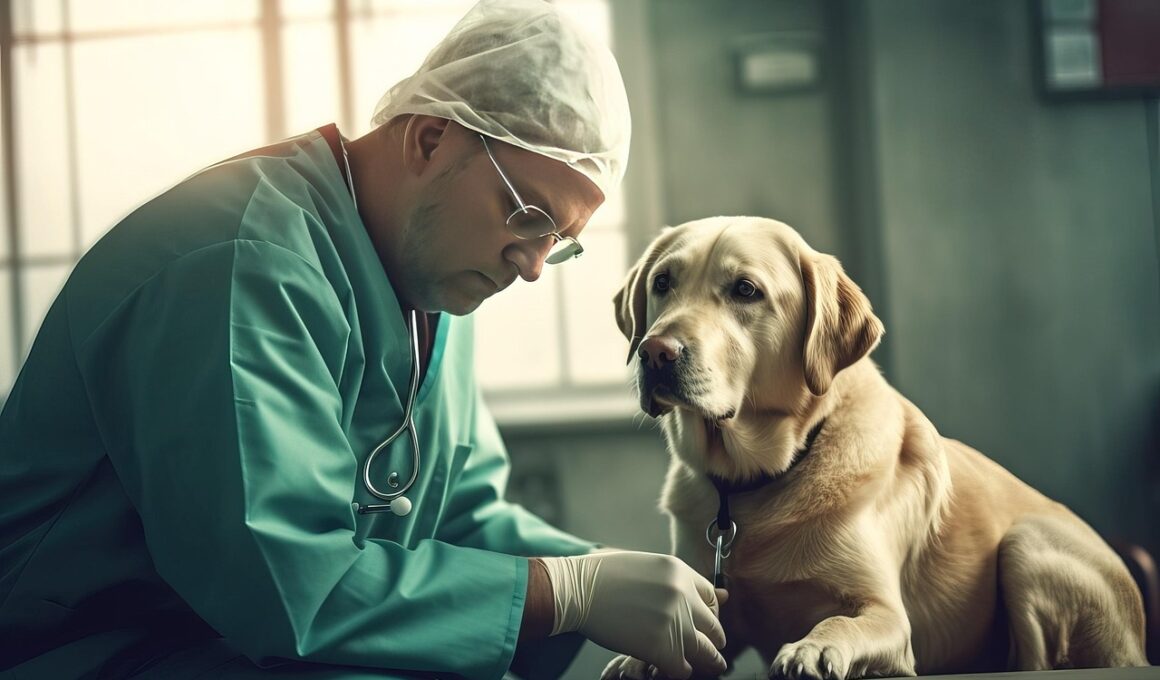Common Mistakes Dog Owners Make About Vaccinations
Vaccinations are critical in maintaining your dog’s health and preventing diseases. Many dog owners, however, make common mistakes regarding vaccinations that can jeopardize their pets’ well-being. One common mistake is delaying vaccinations. Owners often think they can wait because their dog appears healthy; however, many diseases can progress rapidly. It’s crucial to adhere to the recommended vaccination schedule provided by your veterinarian. Another mistake is skipping booster shots. Many owners assume that once their dog has been vaccinated, they are permanently protected. Booster shots are essential for ensuring ongoing immunity to various diseases. Additionally, some owners only vaccinate their animals when required for travel or boarding and don’t realize these shots are necessary for everyday protection. Vaccinating at the right times helps prevent outbreaks of dangerous diseases in dog populations. Furthermore, asking your vet about any local outbreaks can help tailor your dog’s vaccination schedule to keep them safe. Consult with your vet about the best options for your dog and their unique health needs. Regular check-ups will also allow for reviewing vaccination history and addressing any missed shots.
Following the initial vaccinations, dog owners must understand the importance of maintaining a vaccination record. This record serves as proof of vaccines administered and can be crucial if your dog requires medical attention. Some dogs may develop sensitivities or allergic reactions after being vaccinated, which is another vital consideration for owners. Owners often overlook the signs of an adverse reaction, mistaking them for temporary discomfort. Monitor your pet closely for any unusual behaviors right after a vaccination. Additionally, some owners believe that once a dog receives vaccines, no further health measures are necessary. While vaccines provide immunity against specific diseases, they are just one part of a holistic approach to pet health that includes regular check-ups, proper nutrition, and exercise. Engaging with your veterinarian regularly can help you understand more about your dog’s specific needs. Lastly, some pet owners attempt to self-vaccinate by obtaining vaccines from unregulated sources. This is extremely dangerous and can lead to improper administration or expired medications. Always consult your veterinarian when considering vaccination options, as your dog’s health should always be kept as the top priority.
Alongside vaccinations, it is essential for dog owners to educate themselves about vaccinations and the diseases they protect against. Many dog owners do not take the time to learn about the diseases that can threaten their pets, leading to a lack of awareness about the importance of vaccinations. Understanding these diseases can encourage more responsible pet ownership and motivate owners to adhere to vaccination schedules. Furthermore, some owners neglect to consider their dog’s lifestyle when planning vaccinations. Dogs that interact frequently with other animals or spend time in public spaces are more vulnerable and may require additional vaccinations. For instance, kennel cough can spread easily among dogs in social settings, making it crucial to stay current on preventative shots. Another misconception is that dogs receive adequate immunity from natural exposure. While natural exposure can provide some protection, it is often not strong enough to prevent disease effectively, especially in puppies. Vaccination is safer and helps dogs build immunity without the risk of illness. Always discuss your dog’s lifestyle with your veterinarian so they can offer tailored advice on necessary vaccinations.
Understanding Vaccination Side Effects
Aside from ensuring vaccinations are administered properly, understanding potential side effects is another responsibility for dog owners. Some people avoid vaccinations due to fear of adverse effects without realistically evaluating the potential consequences of not vaccinating their dogs. Common side effects can include fever, mild lethargy, or localized swelling at the injection site, which usually resolve on their own. Recognizing these side effects as normal can allow owners to reduce their anxiety around vaccination. However, serious reactions can sometimes occur; therefore, knowing the response signs is crucial. Excessive vomiting, difficulty breathing, or swelling beyond the vaccination site should prompt immediate veterinary attention. Proper communication with your vet regarding any observed reactions ensures your dog receives the best care possible and helps plan for future vaccinations. Moreover, some pet owners mistakenly believe that older dogs no longer require vaccinations. Age does not negate the vaccination needs of your dog, as older animals can still be vulnerable to illnesses. Staying informed about your dog’s health allows you to make decisions that will enhance their long life and well-being, leading to improved owner-pet experiences.
Many dog owners also fall prey to the myth that vaccinations are only for puppies. While the bulk of immunizations occur during puppyhood, adult dogs also require regular boosters for sustained immunity. This misconception can result in older dogs being left unprotected against easily preventable diseases. Some owners might mistakenly believe they can rely solely on natural immunity gained through life experiences, but this can be highly unreliable. Consult your veterinarian often to determine the appropriate vaccination timeline for your dog’s life stage. Similarly, over-vaccinating is a common concern among pet owners. They fear side effects from too many shots and may hesitate to vaccinate altogether. Evidence shows that following a solid vaccination schedule led by a veterinarian minimizes health risks. Communication between dog owners and veterinarians can dispel fears, aiding in understanding the necessity of vaccinations. This collaboration can establish a custom plan suited to each dog’s unique health profile. Making informed decisions allows for maintaining optimum health in your dog while reducing the likelihood of preventable diseases in your household.
Prevention is Always Better
Preventative health measures save time, stress, and financial resources in the long run; thus, vaccinations should not be neglected. Understanding the assumptions surrounding vaccinations is an essential first step toward becoming a more responsible dog owner. Ensuring your dog receives their vaccinations protects not just your pet but other dogs and animals in the community. Protecting one dog benefits the overall safety of others. In particular, preventing outbreaks of diseases like parvovirus and distemper keeps many animals safe and healthy. As part of responsible ownership, owners must be vigilant in educating themselves about local outbreaks and vaccination campaigns in the area. Seeking recommendations from your veterinarian allows for better-informed decisions about necessary vaccinations and health concerns. Besides vaccinations, promoting good hygiene practices in your home and in social situations can also enhance your dog’s safety. Regularly cleaning food and water dishes, as well as common living areas, reduces the spread of diseases. Proper nutrition and exercise bolstered by regular vet check-ups provide a strong foundation for your dog’s health and happiness. This overall holistic approach cements your role as a proactive pet owner who ensures pet rearing is both fun and safe.
In conclusion, dog vaccinations are essential for safeguarding your pet’s health and preventing the spread of diseases within the community. A wide range of common mistakes can lead to less effective vaccination practices, some of which are easily avoidable with proper education. Pet owners must prioritize understanding vaccination schedules, recognizing side effects, and ensuring that they are adequately informed about their dog’s health needs. Collaboration with veterinary professionals remains pivotal in maintaining proper vaccination regimens with respect to changing health needs. Avoiding common mistakes enables pet owners to protect their beloved animals more effectively. As vaccinations are just one part of an overall health strategy, daily care, attention, and active engagement with pet health can lead to happier and healthier lives for dogs and their owners. Being proactive in addressing potential concerns related to vaccinations protects your dog and promotes community awareness. Support your veterinarian’s recommendations and keep updated with best practices regarding pet vaccinations. Adopting these approaches will ensure that owners foster a safe and healthy environment not just for their dogs, but for all animals they encounter.
Now that we have touched on the essence of vaccinations, it is also critical to take note of the variety of vaccinations available. Each vaccine protects against different diseases and should be administered according to the unique needs of each dog. For instance, core vaccines such as rabies, distemper, parvovirus, and adenovirus are vital for every dog, while non-core vaccines like Bordetella and Lyme disease vaccines are recommended based on exposure risks. These vaccines can vary significantly by region, age, and the daily environment of the dog. Understanding what vaccinations your dog needs can be achieved through open conversations with your vet. Regular assessment of the health profile of your dog includes vaccinations, weight management, and diet considerations. Being proactive and thorough ensures that you are addressing all aspects of your pet’s health. Always immerse yourself in learning more about dog health and vaccination needs. Keeping an eye on updates from local health authorities regarding pet vaccinations and outbreaks can better equip pet owners to take the right actions. By staying informed, you position yourself as a responsible owner who is prepared to act in the best interests of your dog.


